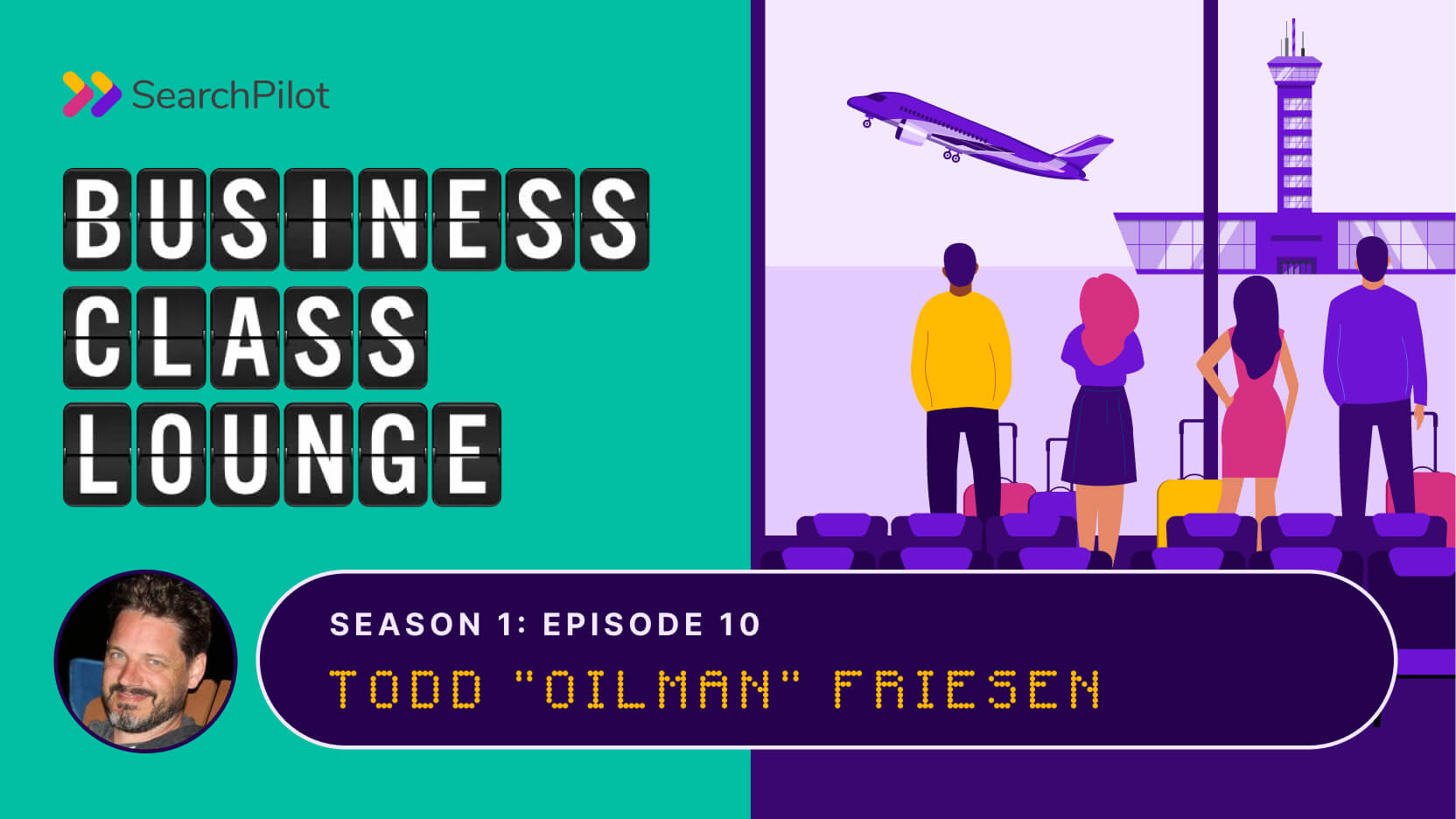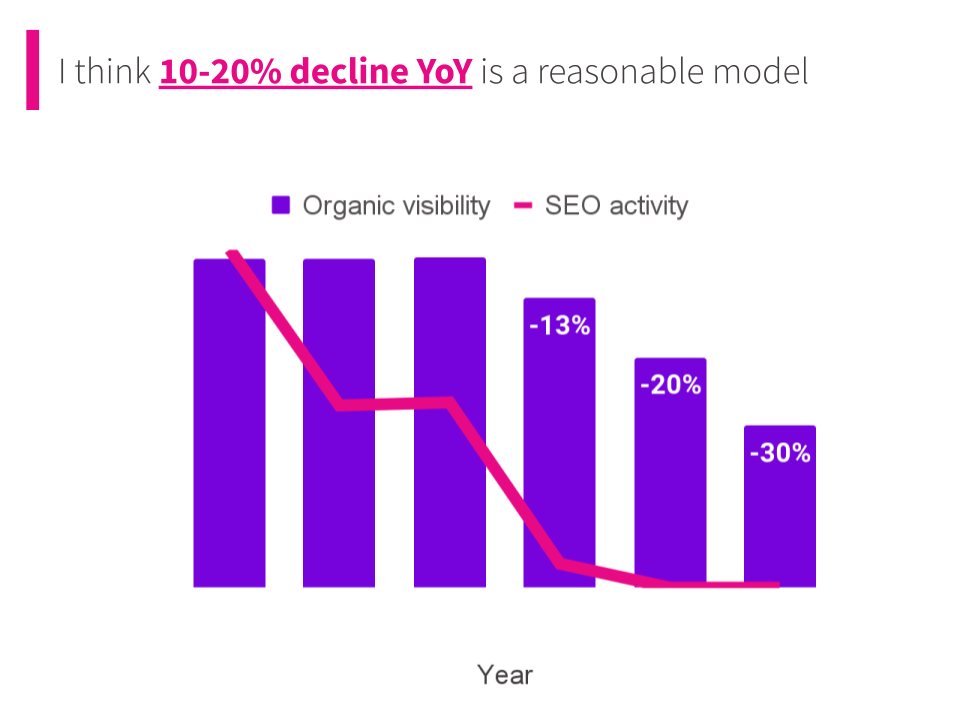I’m really looking forward to sharing this new episode (Episode 4) with you where I interview Jes Scholz, who is the group CMO at Ringier. Jes has one of the most complicated CMO jobs I know of with responsibilities spanning verticals, brands, and markets. I’ll let her describe it because I don’t even know the full extent of it all. She has an extremely strong SEO background and has worked her way up to the group leadership level in a large organization.
I’ve learned a lot from her writing and conference talks on SEO, but I’ve never had the chance to quiz her on leadership and management topics. This podcast is all about speaking to people who’ve done the kinds of things she has. So without further ado, you’ll find the abridged version of the transcript where I share snippets on SEO, marketing, and leadership. If you want to go straight to listening to the full episode now, you can catch it below or wherever you get your podcasts.
Thinking back to the business cases you’ve had to make where you are talking about a substantial investment of time, focus, energy, and money, and you’ve got this, as you put it, “a crazy Jes idea”? Where are you relying on spreadsheets and numbers and forecasts? Where do you rely on storytelling? How do you tease those threads and pull them together?
Jes Scholz (JS): It depends on what the project is. So I’ll give you two examples. We’ve got a project, which is very much coming from my SEO background. When we’re looking at what we can do to step our websites at the group level up to the next level, you can’t focus on ‘optimize title tags’. It just doesn’t work that way so we need something that can benefit every single one of our businesses. For that, we’re working right now on a crawling tool. What our businesses don’t know is that there is not a single tool out there that can prove or measure for you the time from when your article is published or significantly updated to the time that Google comes and crawls it as reported by your log files. And I have to do this across 140 businesses. But knowing that, being able to see, “Okay, for this brand, your time from publication to crawling and thus indexing in most cases is under an hour, while the same business model in another market takes six hours.” We can start to get a real feel for it. Why do you have a difference in discover performance? Why do you have such a difference in Google performance? Because these are the channels where it matters. Time to market really does. Or we are looking at it on the classified side. We have aggregators, we go out, and we scrape all the other websites, and we pull their listings in. And if we get indexed first, guess who gets to show when someone has the authoritative voice. Even though we are not the original publisher, it’s the speed and time to market. What I don’t do when I’m pitching these sorts of ideas to the Steering Committee (termed as SteerCo by Jes) or the powers that be, the powers that will give me the money, is to sit there and talk about crawl efficacy and Google bots and these sorts of things. It’s not going to resonate with them. I really talk about what the business problem is. I say, “We’ve measured it with a proof of concept tool, and it’s taking six hours. That’s a good case for some of the brands. The worst one I found was it was actually five and a half days when I could say it takes five and a half days from when the person lists the job on our platform for it to be able to show in Google, and by that time, that advertisers already passed their period of expectation when they think they should get their applicants back.” All of a sudden now you have buy-in for your tool. Make sure you translate it away from your tech SEO speak into the actual business problem that we’re trying to solve.
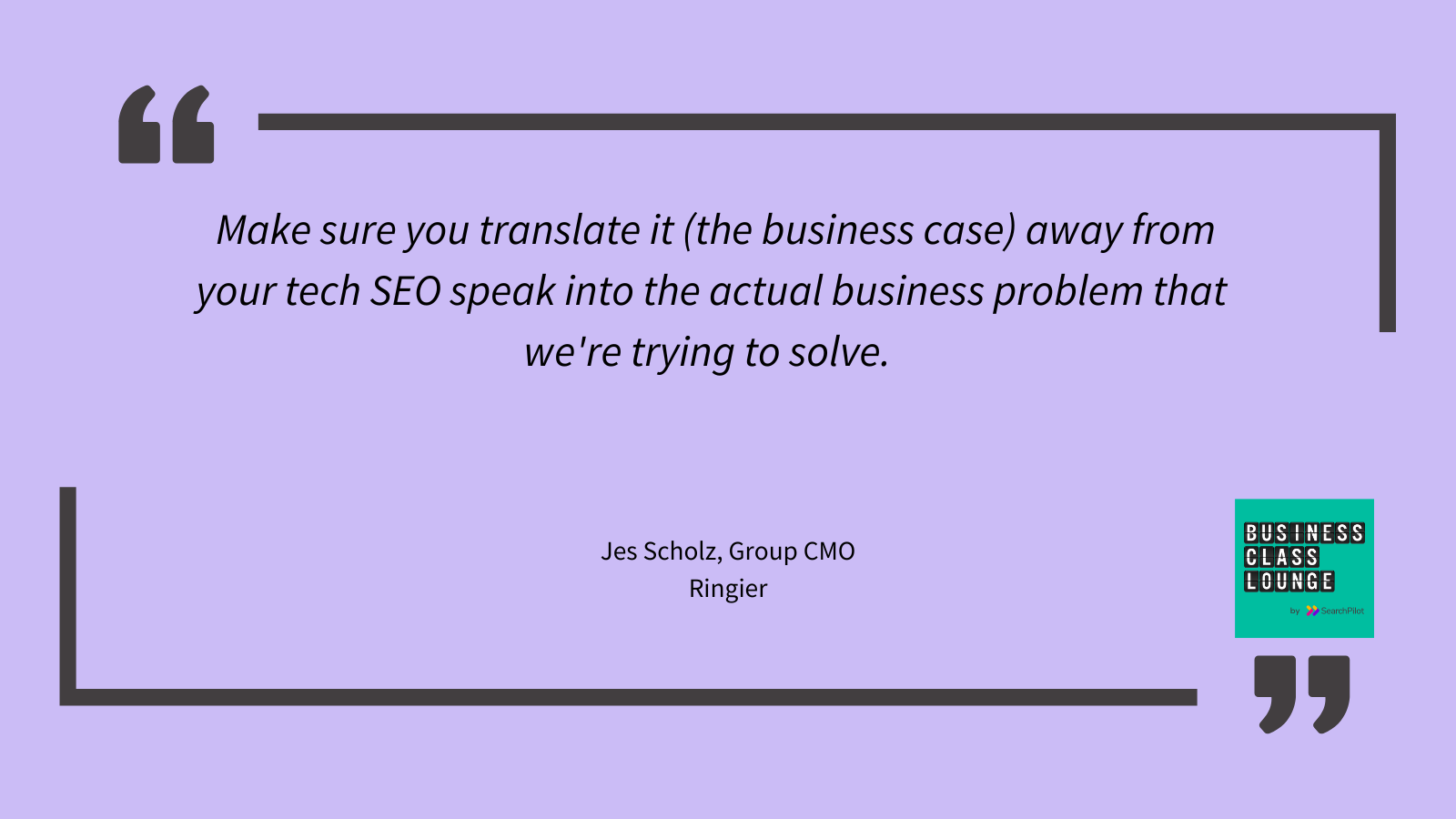
How are you quantifying the upside that’s going to come with this investment? Or how do you think about that?
JS: So on the media side, it’s actually easier because our media businesses have an internally reported metric, which is revenue per session. So as soon as I can say, “If we get indexed faster, then we’re gonna be able to generate this many more sessions, with this much revenue uplift.” So that’s nice and relatively simple. The joy of it is the revenue per session number comes from finance. So if it’s wrong, that’s not on me. I have to give kudos to our finance team that they can provide those numbers, they are a competent team who’s gone to the level of, “Okay we’re going to get into what is actually a KPI for our business.” And we make sure we’re reporting that KPI.
On the classified side, it’s a little bit more challenging because if you just talk about leads or applications for jobs, inherently, that’s not valuable. You have to talk about qualified leads and a minimum number of qualified leads until the advertiser is happy. Because I don’t want you to send me one lead and I don’t want you to send me a hundred leads. I want you to send me 10 qualified people that I can then cull down to whatever I want. So it’s a bit more difficult, and you have to go into: are you talking B2B or B2C? What KPIs are you trying to move and trying to take away from organic sessions? For me, that will never really stir a group executive board or a SteerCo.
You can’t talk about organic sessions. You have to talk about the outcome of those sessions and how that outcome then ties into group revenue or retaining paying customers.
Then we’ve got another tool where we’re focusing on essentially distributing our content. It’s one of the strategic tools that we are building to defend against [inaudible] among other things because it does distribute to Google and Facebook. But there, the challenges are you have an idea, you have a marketing vision.This is the tool that we could build, and this is what it could do. But you’re never going to be able to build that thing alone. So all of a sudden you’re pulling in tech, and you’re pulling in product because you always want them to be making it nice and rounded. We’re pulling in our data science team because we need algorithms to make this work better than whatever you could buy out on the market and customize it for our needs not just have a general distribution thing that’s not gonna get me where I need to be best-in-class. So you are pulling these people on board, you’re getting them excited about the project, which is excellent, but they bring on all of their own ideas. So it becomes very much a project management skill and balancing what you want versus what they want versus what the businesses want. That’s a job in and of itself.
What do you look back on, from the SEO shop floor to CMO, that you think was a pivotal moment in your career? Or what would you encourage other people to think in a particular way that’s worked for you to get you where you are now?
JS: I would love to sit here and say I had a 10-year plan and it was that. The reality is how you set out to become, whatever position you are in now in executive leadership, the reason you get there is one of two things. Either it’s serendipity because you were just in a right place at the right time. And if it’s not serendipity, then it’s nepotism. And for me, it was very much serendipity. I got the role that I have because a friend knew it was being advertised. It wasn’t even being advertised publicly, and she just went, “Oh, you might like this job.”. And I came into the company at the right time before there was a strong presence of the international units. They’re just starting out. I’m still in my twenties, and no one’s going to be listening to a twenty-something when it comes to strategy. My boss at the time really understands people. And I think he saw in me that I’m the type of person that has a driver personality. I’m just going to do what has to be done, and just keep pushing and pushing and pushing and pushing. And that means I don’t need someone over-lording me. If I have a boss who wants to know too much about what I’m doing, I feel a bit stifled. So I had this great opportunity in a company that was trying to establish something relatively new because we’re in emerging markets at that point in time. The international units were really only focused there.
My boss saw that I knew what I was doing so he lets me do my own thing and we catch up once a quarter. I give him a big rundown of everything that’s going well, and the things that aren’t going so well, and that’s really the relationship for a long time. It’s just, I do my thing I go in the areas that interest me, but the areas that interest me are often the ones that drive the business forward because we’re talking about organic. If you’re looking at marketing and you have someone who comes in and just fixes organic as their top priority, as a boss you’re generally pretty happy. Because I’m not the person who goes and take the quick CPC-win, unless I’m under business pressure tohit the KPI. I think that focus on the midterm and the long-term wins, that focus on scalability and how I do this for multiple brands - changed my way of thinking. I’d never look at a single brand and a single case, so I never really did the, “I’m gonna optimize the title tag”. Sorry to anybody who optimizes title tags, I know it can be very impactful, and you should split test it, but that’s just never been my focus.
It’s always been these big, scalable, high-impact projects, which sometimes didn’t have the high impact, but at least there was the idea. And when they worked, they worked. And this is what really got me to where I am.
I could take a full retrofit of the information architecture, and do that as a case study on a brand, which normally, you don’t do a case study of information architecture if you only have one brand. But for me, that’s what it was. I could take one of the brands where we had a bit more flexibility, do the case studies and show, “Hey, this has a 35% lift in organic, which is the number one traffic source.” Then all of a sudden you have the buy-in to do this on the bigger brands, and you prove these cases over and over. Now we’re working on brands which have over 10 million monthly active users because the team has the trust and they know that we’re not going to come in on these huge portals and do crazy ideas because we would test it in our own ways first. That gave me a lot of clout and that clout is really what allowed me to move up.
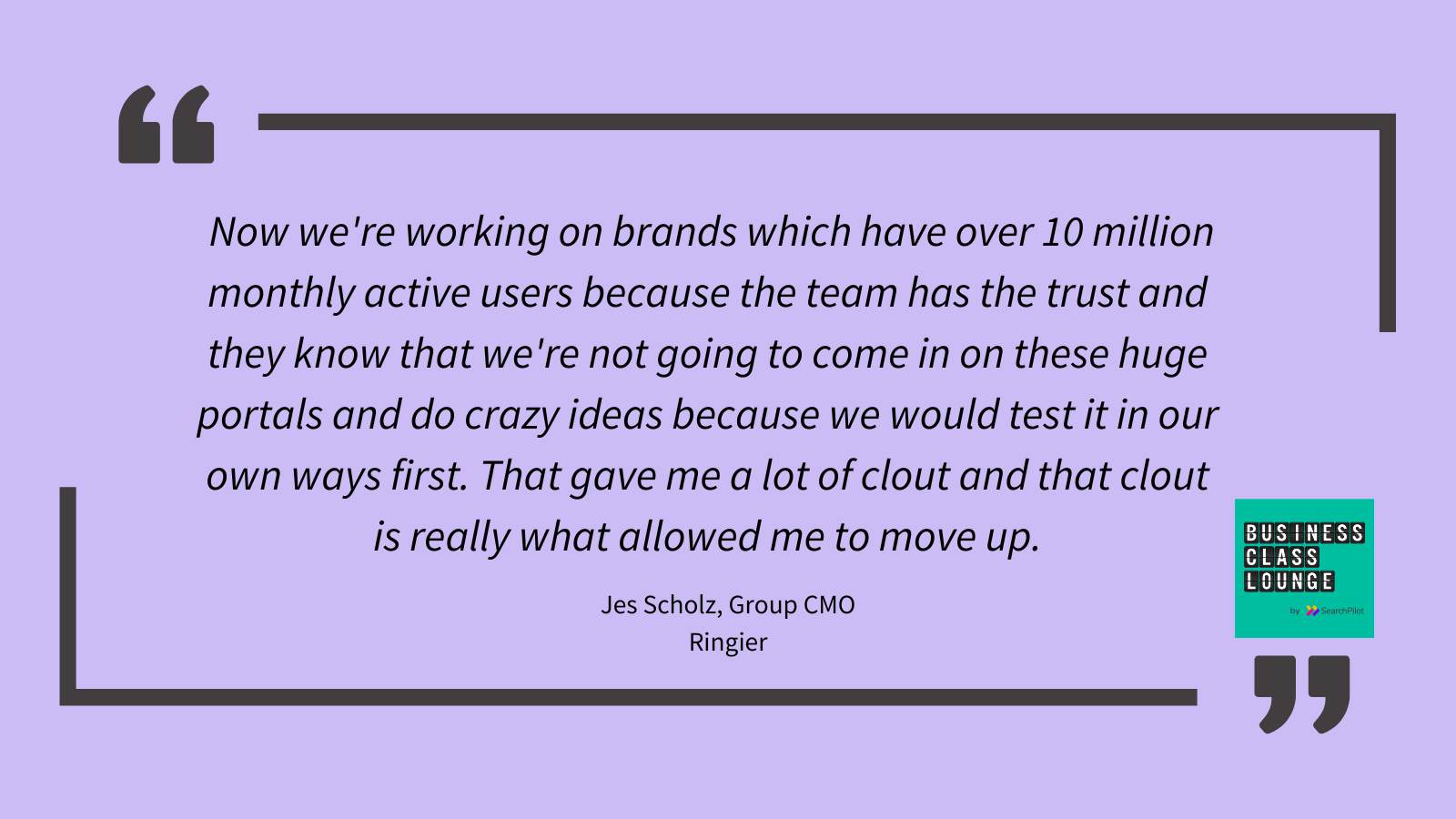
I’m fascinated by the story of that boss who you met once a quarter. I don’t think I’ve ever read a management book that suggests you meet with a direct report once a quarter. Do you think it was just a case of it working because it was you and you were on your path to the C-suite and that you were very self-driven and self-determined?
JS: This is a person who, I think one of his talents is people. This person who was also relatively young for his position, so there wasn’t this huge generational gap. He had a passion for digital, he had a passion for his job, and that is infectious to an extent. But I know how he managed me is different to how he managed other people, and ironically, how he managed me, I don’t pass that down. I’m very much a different manager. But I still see him today, even though he’s not in my direct report line at all.
He’s someone who I will always have a lot of respect for and just trust. That’s what it comes down to. I knew that he trusted me to do my job well, and that’s why he gave me the freedom and I trusted him to have my back. So if I fell down, I knew he would be there and pick me back up. He wouldn’t sacrifice me if a project went wrong, and that really makes a difference because it’s not that every single idea I’ve had has produced a 35% increase in organic sessions.
No, we’ve had a lot of failures, but I wasn’t scared of that. I knew I could have those failures. I knew I could trip up. I knew I could not be perfect and it would be okay.
How have you done your learning and personal development? How have you made sure that you got better at the things that aren’t the stuff that you already knew?
JS: With email, for example. We wanted to get a group-level email solution because then obviously you can buy at scale. It’s cheaper for everyone. You can transfer strategies. It’s a no-brainer for a company to have a group-level solution. This is something that I wanted to put in place which I did put in place really early. But at that point in time, I was not an email specialist.I thought yeah I could code in HTML, but I thought that email HTML was the same as web HTML. We bought this group-level tool, and I acknowledged that I didn’t know what I was doing there. So I hired a project manager to work with the developers to roll it out. We spent too much money on a project manager, and this is one of my failed projects, completely out of scope and way over timelines. It wasn’t implemented, and the developers were all really angry. So I had to actually learn this tool to figure out what we were doing wrong. So it wasn’t that I sat down one day and wanted to become an email marketing specialist. It was, “Oh God, I’m gonna get my ass handed on a platter if I don’t fix this.”
So I learned everything there is to know about our group email tool solution. And from that, I can easily now keep up with what the specialists are doing. And help steer them - you might wanna test this, you might wanna test that. And then for me, because you’ve got that, it’s not just the base ground, and you do have a deep understanding, albeit for me, of this one tool you can follow along with all of their tests.
And what we do as a company, and I think this is one of the strengths of my team, is we do not just release the test, look at the data, and yeah it’s green - good, next test. For every single test we do, I force them to write down why the metrics went the way they did. Did you actually cause it, or was it just the trend and you’re taking credit for it? That’s way too often the outcome. And they have to go into these why’s, and I read through those to make sure that they’ve truly gone deep into it. And as I read through it, I get all of these insights. So you learn because you make your team do the things. And if you understand what they’re writing in their marketing-speak, you can give constructive criticism on that. You’re always learning.
I just read, and I listened, and I tested, and I think a lot of it is connecting dots because you think things through deeply at 3:00 AM in the morning when your daughter won’t sleep.
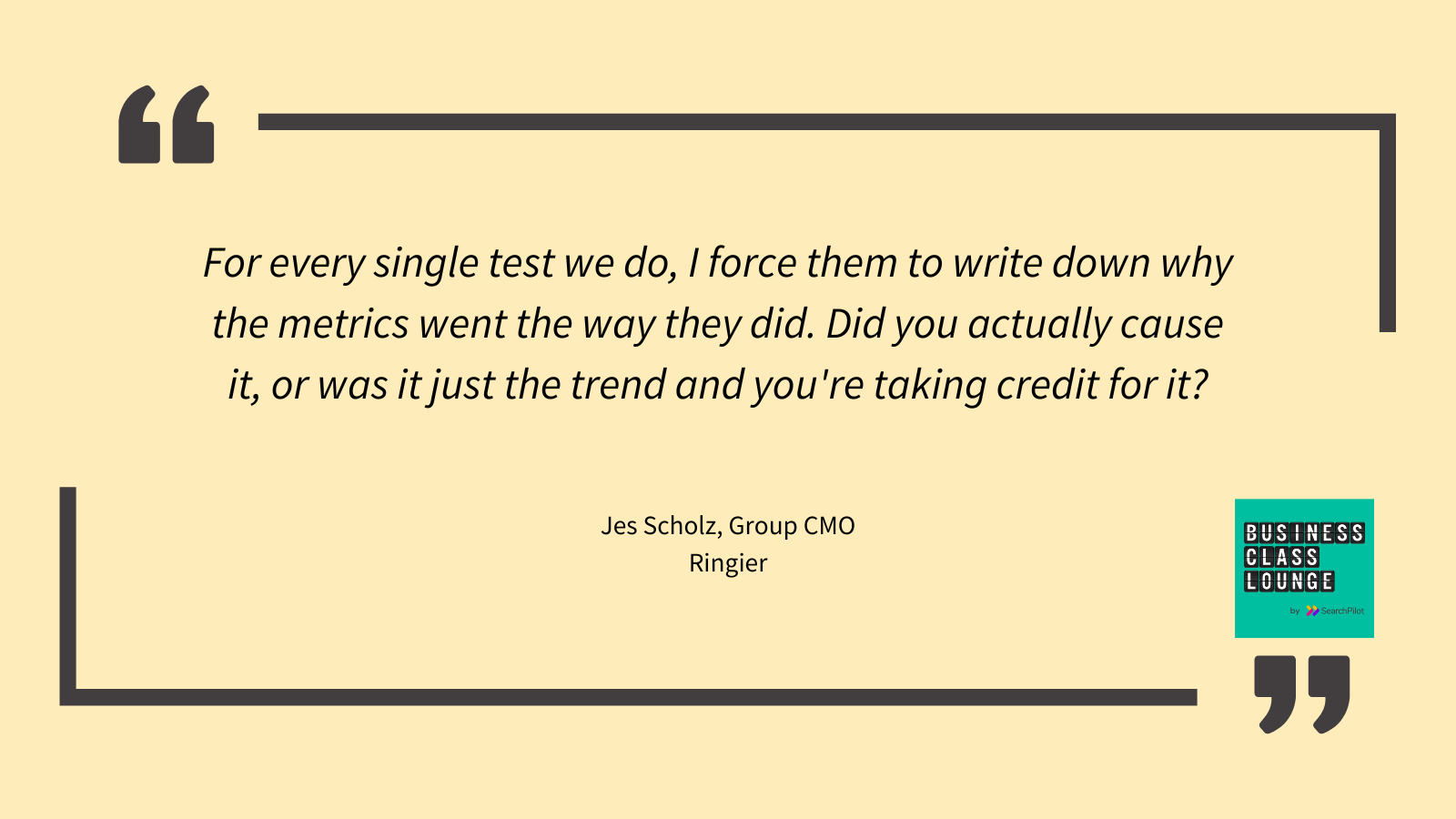
How have you thought about the leadership side of personal development?
JS: It goes through phases. So there’s the good boss that I was talking about earlier. About four years of working together, he was about to promote me and I didn’t know it at the time. He just came up, and he said, “You are going to St. Gallen, and you’re taking a leadership short course.” And I came out of it so invigorated and wanted to implement all of these ideas. Then six months down the track, of course, I hadn’t because you haven’t, because you have an actual job to do, and that’s a full-time job. At that point in time, my 40-hour work week was in reality a 70-hour work week, so I didn’t have time for any of it.
And I have that every single time I read one of those leadership books. I’d read it, I’d love it. I’d wanna do that. I’d wanna implement it. I’m gonna plan to spend more time listening to my team, and less time talking about what I think they should do. Let them do more grassroots, all of these things that you read. That sounds beautiful, but that doesn’t work for me. So I find that my leadership style, it’s very much is what it is. It’s not that it doesn’t grow and change over time, it just doesn’t go through these. People who come into my team do one of two things. They come in, and they stay for years. Or they come in and leave within six months, and there’s not really anything in between. So it’s good for me overall because I do get this core team who really focuses on long-term strategy because as far as I know, they’re all planning to be there for the next few years.
And people leave because they want to change career paths which is very common. And this is one thing that I did get from my boss, which is he took care of me, he gave me a career path to move up, and
I want to make sure that I give that down to the people in my team. They need to know there is a next step for them to go to. They can take on more roles and responsibilities, and they will be rewarded with additional salary when they deliver on them.
You’ve got these fundamentals of retention that I believe shouldn’t be fundamentals and that I try in so much as the company policies and the budgets that I’m given to allow me to really live that through. But you do get people who when they come in, it’s the wrong culture, it’s the wrong fit. I get accused of, yeah, some crazy names I’ve been called throughout the years. But I just see it as, “Okay, that’s not the right fit. Good. We found it out early and move on”.
I think one thing we do as part of the recruitment process, and this is something I did actually get out of a management book, is it’s not just me recruiting. If someone’s coming into the team; it’ll be me, someone else who will ideally be in their direct line or they will work very closely with if the direct line’s not an option. And then we do a panel interview at the end. So in that, they get a fair view. I’m quite upfront with - “if you don’t love data, you won’t fit in this team. If you won’t get down in the weeds and do the work, you will not fit in this team. If you don’t wanna do crazy things and learn to think outside the box and fail sometimes, you won’t fit in the team."
Further links
There are more great discussions like this, so head over to wherever you get your podcasts Apple, Spotify, Amazon, YouTube or you can catch the full episode directly from the feed here.
I’d love to hear your thoughts on this fourth episode, email me at podcast@searchpilot.com or send me a message on LinkedIn. You can also find Jes on LInkedIn and check out her work at Ringier.


